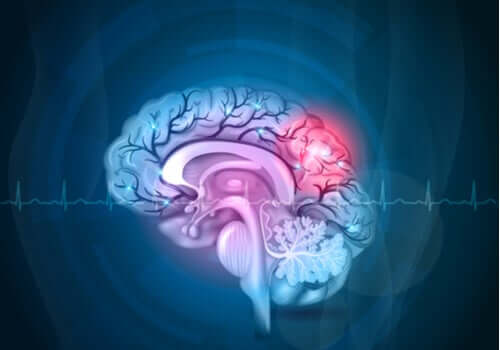The Difference Between the Brain and the Mind


Written and verified by the philosopher Isbelia Esther Farías López
There’s a huge difference between the brain and the mind but many people often use these terms interchangeably. This is most likely because they’re not clear about their individual functions.
The brain is in the tangible space – what you can observe if you divided your being into a tangible and a non-tangible reality. Meanwhile, your mind would occupy the place of the non-tangible or what you can’t touch.
Human beings are complex. Studies indicate our nervous system is made up of one hundred billion neurons, all interconnected. Other research also indicates the sheer complexity of our brain and reveals astonishing details.
For example, the cranial cavity protects the brain by means of the bony covering. Furthermore, the brain weighs about 3 pounds and is surrounded by membranes and fluid. Thanks to our brain we can feel, think and do things.
The differences between the brain and the mind
Knowing these details, we can now affirm the brain is an organ, like the rest of them, one we can physically examine. In contrast, we can neither see nor touch the mind. It’s inside the neurons that are part of our brain and it helps us make judgments and shape our feelings in order to understand the reality around us.
Our brain is made up of three important parts: the cerebellum, the brain stem, and the encephalon. It’s also divided into two hemispheres, left and right. Each of these has a frontal, temporal, parietal, and occipital lobe.
What’s known as “gray matter” is actually the cerebral cortex, and is the external part of the brain that makes it possible to perform thinking functions. The cerebellum allows us to move, no matter how difficult or complex it may be, and to do so without the need to think.
Learn more about the Parts of the Brain and Their Functions
The functions of the brain

This brain network makes our survival possible by performing important functions such as:
- It regulates vital functions such as temperature, breathing, blood pressure, sleeping, and eating, among others
- It receives information from the senses but it also processes, integrates, and interprets what we perceive via taste, hearing, sight, smell, and touch
- Also, it generates the world of our emotions and behaviors
- It controls movements, such as running, walking, and talking, among others
- Thanks to the brain we can think, feel, and reason
- It allows us to perform advanced cognitive functions, such as perception, memory, and learning
All of these lead us to wonder how the mind and the brain interact or relate to one another.
The relationship between the brain and the mind
OK, so now you’re clear on the differences and know the brain is a physical organ one can physically look at, touch and study. You also know this isn’t the case with the mind. Thus, let’s get into how they connect in order to work together.
The work that the brain and the mind do is actually really wonderful. For example, you’re trying to reach an object and you think about it. Thus, the brain receives that signal from your mind, activates the necessary nerves and the arm executes the movements.
Your mind conceives your thoughts but the brain follows up with the actual work or process at the physical level.
Find out why Hydration is Essential for Your Brain
Your mind is what makes you unique

It’s incredible how all animals are born with indispensable resources to survive, and most of us act instinctively. However, we humans differ from others in the mental processes we can execute.
The brains of animals can only perform basic tasks for their survival. Their functioning is rudimentary and the actions obey stimuli. In contrast, humans also have a mind and carry out processes both consciously and unconsciously.
As you can see, our mind helps us analyze thoughts and interpret data. We can even construct beliefs and integrate them into our conscious or unconscious world.
Our brain and mind are impressive and their tasks are equally amazing. They work hand in hand and this is why we can make use of intuition, imagination, perception, and concentration, among others.
Finally, as you read above, the mind and the brain are different and we must be clear about this when referring to them. All clear?!
All cited sources were thoroughly reviewed by our team to ensure their quality, reliability, currency, and validity. The bibliography of this article was considered reliable and of academic or scientific accuracy.
- Evolución, cerebro y cognición. (2010). Psicología Desde El Caribe.
- Peronard Thierry, M. (2009). Metacognición: mente y cerebro. Boletín de Filología. https://doi.org/10.4067/s0718-93032009000100010
- Manes, F., & Niro, M. (2015). Usar el cerebro. Usar El Cerebro.
- Searle, J. R. (1985). Mentes, cerebros y ciencia. Teorema.
- Thagard, P. (2019). El cerebro. In La mente. https://doi.org/10.2307/j.ctvm7bd13.13
- Vygotsky, L. S. (1964). Acción, Pensamiento y Lenguaje. In Mente y Cerebro. https://doi.org/10.1157/13094810
This text is provided for informational purposes only and does not replace consultation with a professional. If in doubt, consult your specialist.








